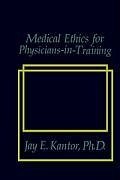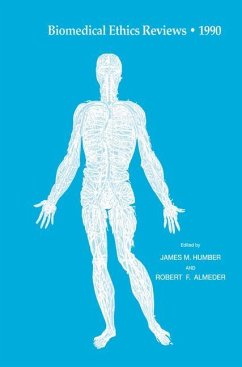
Medical Ethics for Physicians-in-Training
Versandkostenfrei!
Versandfertig in 1-2 Wochen
77,99 €
inkl. MwSt.
Weitere Ausgaben:

PAYBACK Punkte
39 °P sammeln!
The recent interest in biomedical ethics has resulted in the publication of a great many textbooks in the field. As good as many of these texts are, their attempts to encompass the ethical issues in all areas of health care have left them wanting in comprehensive treatments of specific areas that are of immediate concern to clinicians, and over-comprehensive in areas that are peripheral. While the numerous anthologies of articles have the merit of not presenting students with a single biased approach, they usually have the disadvantage of pre senting articles that are narrowly focused criticis...
The recent interest in biomedical ethics has resulted in the publication of a great many textbooks in the field. As good as many of these texts are, their attempts to encompass the ethical issues in all areas of health care have left them wanting in comprehensive treatments of specific areas that are of immediate concern to clinicians, and over-comprehensive in areas that are peripheral. While the numerous anthologies of articles have the merit of not presenting students with a single biased approach, they usually have the disadvantage of pre senting articles that are narrowly focused criticisms of other narrowly focused articles. On the other hand, texts by single authors tend to be overly theoretical in their approach. The philosopher teaching ethics in a medical school or in a hospital set ting must tread a difficult intellectual path. There are no "desert island" issues in clinical ethics, and few of the actual cases can be simply stripped down to clear con flicts between two philosophical theories. The horns of vii viii Preface the dilemmas that he encounters are more likely to re semble a stag's horns than a bull's. A philosopher work ing in these settings must quickly change his accus tomed approach to philosophical issues if he is to be effective. Very often he will be presented with an issue that he would prefer to mull over for a year or two, but which will require some sort of immediate direction or resolution because action must be taken.














